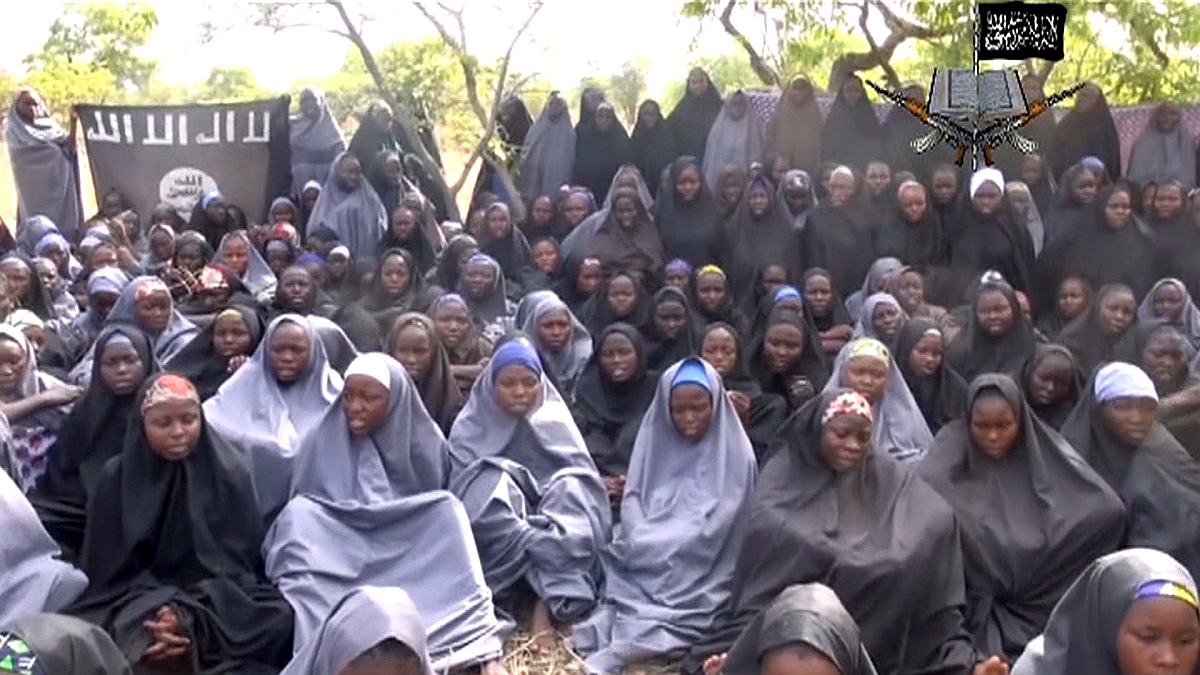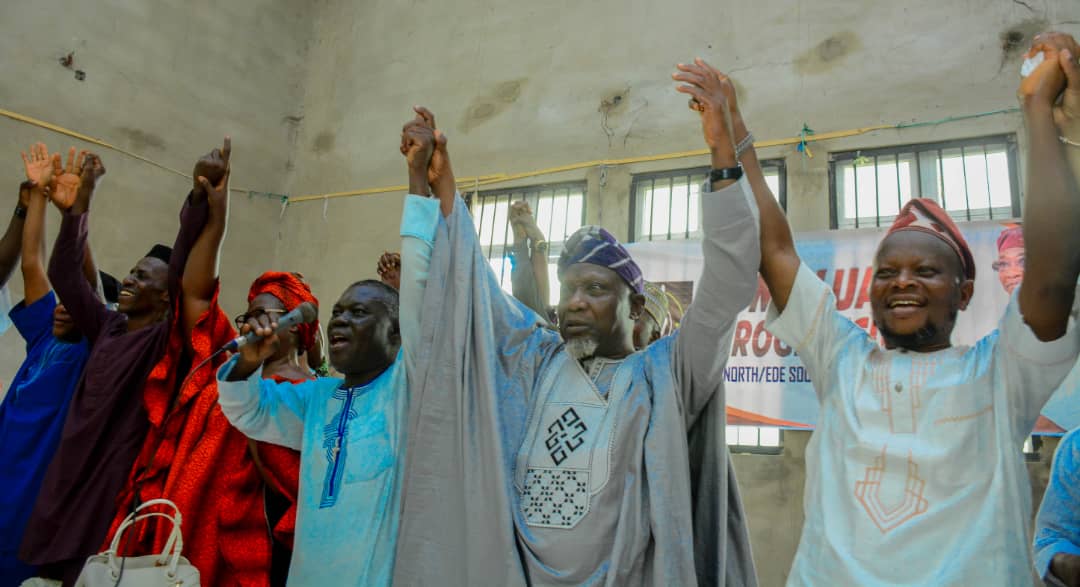Today In History: Boko Haram Abducts 276 Chibok Girls, 91 Still Missing Till Date


On this day in history, Osun Defender travels back to April 14, 2014, when Boko Haram abducted 276 girls from their dormitories in Government Girls Secondary School, Chibok Local Government Area of Borno State. While 128 regained freedom in batches over nine years, the whereabouts of 91 others remain unknown.
The abduction of hundreds of schoolgirls in Nigeria not only shocked the nation but also captured global attention, leading to the birth of the international movement known as #BringBackOurGirls. This incident thrust the group responsible, led by the late Abubakar Shekau, into the international limelight, drawing widespread condemnation and calls for action.
In the aftermath of the abduction, harrowing reports emerged detailing the fate of the kidnapped girls. Many were forced into marriages with insurgents against their will, a cruel fate that robbed them of their freedom and dignity.
Those who resisted faced severe consequences, enduring unimaginable hardships and suffering.
The plight of these girls sparked outrage and galvanized a global campaign to rescue them and bring the perpetrators to justice.
The #BringBackOurGirls movement became a symbol of hope and solidarity, rallying people from all corners of the world to stand against the injustice and brutality faced by these young victims.
Analysts argue that the handling of the kidnapping by the Goodluck Jonathan administration exacerbated the situation. The politicization of the abduction and the government’s reluctance to accept foreign assistance and mercenaries hindered efforts to rescue the captives, prolonging their ordeal and raising concerns about the government’s commitment to resolving the crisis.
Furthermore, the success of the Chibok abduction was seen as a turning point that emboldened other terror groups. This high-profile kidnapping demonstrated the potential impact of targeting schools and abducting students, leading to a disturbing trend where educational institutions became increasingly vulnerable to attacks by extremist groups seeking to instill fear and gain leverage through such heinous acts.
The Murtala Muhammed Foundation recently released a report detailing the journey of the Chibok girls who were abducted between 2014 and 2023. Over these years, many of these girls managed to regain their freedom through various means, although the ordeal for many continued.
During their initial abduction, as the students were being transported to the Sambisa forest in a truck, 57 of them bravely jumped off the vehicle, escaping the clutches of their captors. However, 219 girls remained onboard, facing an uncertain fate.
In May 2016, a significant breakthrough occurred when one of the girls, along with her six-month-old baby and a Boko Haram member she was forcefully married to, was rescued by members of the Civilian Joint Task Force. This rescue offered a glimmer of hope and demonstrated the potential for successful interventions.
Five months later, in October 2016, 21 more girls were released through a swap deal facilitated by the Swiss government and the International Committee of the Red Cross. This negotiation marked another step towards freeing the remaining captives and showcased the importance of international collaboration in resolving such crises.
In November of the same year, another Chibok captive, Maryam Ali-Maiyanga, was discovered with a child, adding to the growing number of girls who had been found or rescued since their abduction.
In May 2017, a breakthrough was achieved when 82 of the abducted girls were released following further negotiations with the terror group. This significant release was a cause for celebration but also highlighted the challenges and complexities involved in securing the freedom of the remaining captives.
Four months prior to this, in January 2017, another Chibok captive, Rakiya Abubakar Gali, was rescued along with a child, further reducing the number of girls still held in captivity.
In 2018, there was another positive development when another victim, Salomi Pogu, was rescued, bringing renewed hope to the families and communities affected by the abduction.
However, there was a three-year gap with no further successful releases until 2021, when another four Chibok girls regained their freedom.
Two of them managed to escape on their own, while the other two were rescued, demonstrating the resilience and determination of these young women.
The following year, in 2022, 11 more girls were rescued, further reducing the number of captives and reinforcing the ongoing efforts to secure the release of all the remaining girls.
Last year, in 2023, another four girls were rescued, bringing the total number of rescued or escaped girls to 128.
While this progress is significant, there are still many girls whose fate remains unknown, underscoring the ongoing challenges and the need for continued efforts to secure their release.
Where are the remaining girls?
A total of 91 Chibok girls are still unaccounted for, despite ongoing efforts to locate and rescue them. Tragically, some of the girls may have lost their lives while in captivity. Reports from rescued girls suggest that some victims have died during their time as hostages, adding to the anguish of their families and loved ones.
In addition to those who may have perished, there are also girls who have chosen to remain with their Boko Haram captors. Some have found love in captivity and have decided to stay with their husbands, complicating efforts to secure their release and reintegrate them into society.
However, the dynamics within Boko Haram have shifted over the years, leading to internal divisions and splinter groups. The group has lost many of its fighters due to an internal split that resulted in the creation of the Islamic State West Africa Province (ISWAP). This internal turmoil has weakened Boko Haram to some extent, affecting their ability to maintain control over their captives and potentially opening new opportunities for negotiations and rescue efforts.
Despite these challenges, the search for the remaining Chibok girls continues, with hope persisting that they may one day be reunited with their families and loved ones.
Meanwhile, the parents have urged First Lady Oluremi Tinubu to leverage her influence to secure the return of their daughters.
“We are haunted by the memories of that night when our girls were taken from us, and every day, we pray for their safe return,” the parents said in a letter to the First Lady. “We have not lost hope, Your Excellency. We have not given up on our daughters, and we will continue to fight for their freedom until they are brought back to us.”
“We urge you to use your influence and your platform to ensure that the plight of the Chibok girls is never forgotten, that justice is served, and that those responsible for this heinous act are held accountable.”


Sodiq Lawal is a passionate and dedicated journalist with a knack for uncovering captivating stories in the bustling metropolis of Osun State and Nigeria at large. He has a versatile reporting style, covering a wide range of topics, from politics , campus, and social issues to arts and culture, seeking impact in all facets of the society.










